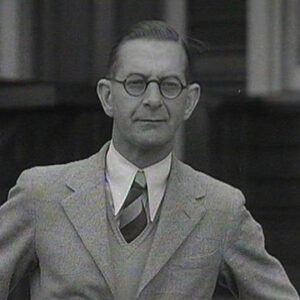Sir John Frederick Neville Cardus was a music critic and novelist from England. Due to his lengthy work as a cricket reporter spanning about five decades, he is considered as one of the finest cricket writers ever. His mother was a part-time prostitute, and he had a difficult childhood. He grew raised in his maternal grandparents’ home. He didn’t finish high school, but he did a lot of reading at the local library. He established his fame as a cricket writer, but his true calling was as a music critic, and he worked in both roles over his lengthy career at the Manchester Guardian. He worked for the ‘Manchester Guardian’ for over two decades before being laid off at the outbreak of WWII, and he moved to Australia to work for the ‘Herald’ and later the ‘Sydney Morning Herald.’ After his time in Australia, Cardus returned to England and worked for a variety of publications in the later part of his career. He also contributed to the Wisden Cricketers’ Almanack in addition to the ‘Times’ and ‘The London Evening Standard.’
Childhood and Adolescence
Neville Cardus was born on April 3, 1888, in Rusholme, Manchester, England, parents Ava Cardus. His father’s identity is unknown. When his mother was pregnant, she married a blacksmith called John Frederick Newsome, but the marriage was short-lived, and she returned to her father’s home. To meet the family’s financial needs, his mother turned to prostitution.
He was enrolled in a school sponsored by the local school board, and the instruction he received there was inadequate. He gradually developed an interest in writing. When he was still in school, he had his first piece published in ‘The Boy’s World’ magazine.
He dropped out of school after only five years, yet he had a voracious thirst for reading and writing. Following his grandfather’s death in 1900, he took on several odd jobs, including that of a clerk, while immersing himself in reading literary, philosophical, and scientific works of the day. He studied at Manchester University and played cricket in the club circuit whenever he could.
Career of Neville Cardus
After a couple appearances in the Manchester cricket league circuit, he applied for and was hired as the assistant cricket coach at Shrewsbury School in Shropshire country in 1912. He worked there for four years, eventually becoming the secretary to the headmaster. He also worked as a music reviewer for the ‘Daily Citizen’, a Manchester-based daily.
He applied for a job at the ‘Manchester Guardian’ newspaper in 1917 and was hired on an unpaid basis. However, he quickly established himself as a writer, and within a year he was in control of a column. He was promoted to junior drama critic after a year on the job. But it was the post of music critic that he really aspired to.
For the first time in 1919, he was requested to cover a cricket match, and his first report was on a match between Lancashire and Derbyshire. He was appointed cricket reporter of the ‘Manchester Guardian’ a year later, a position he would occupy for the following two decades. His reports were credited to him as ‘Cricketer.’ In the same year, he was appointed as Samuel Langford’s deputy chief music critic, and after seven years, he was promoted to chief music critic.
Throughout the 1920s, he covered cricket matches featuring Lancashire, particularly those between the county and Yorkshire rivals. During that time, his language and manner were quite famous, as his personal style resonated with readers. In 1936, he traveled to Australia as a correspondent to cover the Ashes series.
Following the commencement of World War II, he remained jobless, and in 1939, at Sir Keith Murdoch’s invitation, he began working for ‘Herald,’ with his first assignment being to cover a tour by Sir Thomas Beecham. After that, he went to work as a music writer for ‘The Sydney Morning Herald.’ He spent eight years in Australia, where he published the books “Ten Composers” and “Autobiography.” For the ‘Sydney Morning Herald,’ ‘The Times,’ and ‘The Manchester Guardian,’ he covered the 1946-47 Ashes cricket series.
Before returning to Australia in 1948, he had brief but failed stints at ‘The Sunday Times’ and ‘The London Evening Standard.’ He returned to England on a regular basis, and after working on the 1950-51 Ashes series in Australia, he returned to England. Upon his return, he was appointed music critic of ‘The Manchester Guardian.’
He continued to be a busy cricket writer in the 1950s and 1960s, contributing to a number of prestigious journals. He published an annual essay for the famed ‘Wisden Cricketers’ Almanack,’ covered the 1953 Ashes series for the ‘Manchester Guardian,’ and flew to Australia to cover the Ashes for the ‘Sydney Morning Herald’ in the 1954-55 cricket season. He worked until he was eighty years old, mentoring young authors who wanted to pursue a career in cricket writing.
Major Projects of Neville Cardus
Apart from his extensive collection of cricket writing, which is widely recognized as the best cricket literature, his autobiographical writings titles “Autobiography,” “Second Innings,” and “My Life” are among his best works.
Achievements & Awards
In 1964, he was appointed a Commander of the Order of the British Empire.
The British Queen bestowed a knighthood on him in 1966.
Personal History and Legacy
He married Edith King, a professional actress and art instructor, on June 17, 1921. The marriage lasted 47 years, until his wife died. They didn’t have any children and didn’t always live together.
He died on February 28, 1975, at the age of 86, at the Nuffield Clinic in London. He had slumped at his home a few days before his death, but the cause of death is unknown.
Estimated Net Worth
Neville Cardus’s net worth or net income is estimated to be between $1,000,000 and $5,000,000. He amassed such money through his primary work as a journalist.


